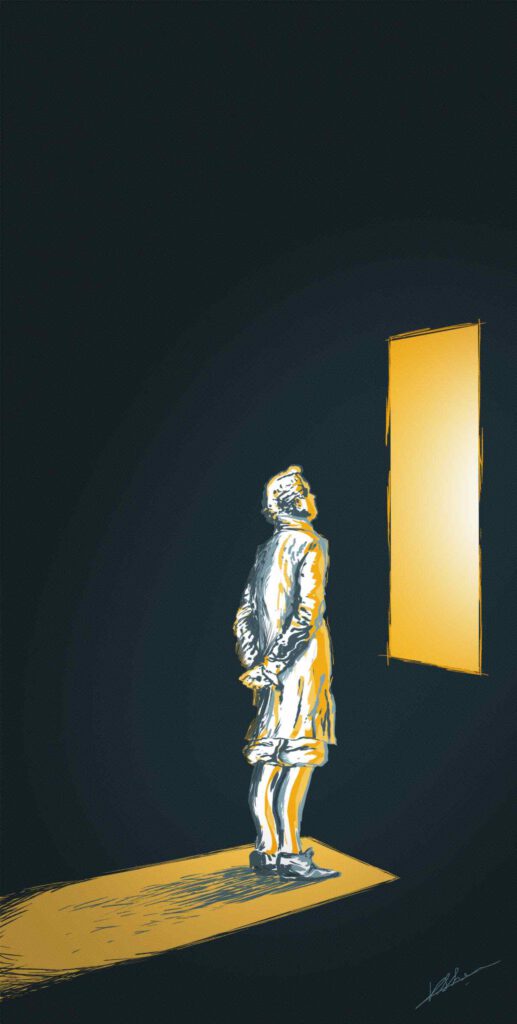[Editor’s note: This is a continuation of a story Roger was working on when he passed away. This ending is one of many we received. To read Roger’s beginning to the story, from the end of which each entry picks up the thread, go here. Illustration by Krishna Bala Shenoi.]
Josh Pierce writes:
A giggling throng of girls are encircled around a hunched figure. The sound in the modest amphitheater, the walls decorated by antique pastoral panels of marble, is nearly mute aside from a few hushed whispers and the titterings from the girls. A wrinkled hand touches down on a key of the organ and plays a single, sustained note.
The audience settles into their seats facing the organ and its player. The pianist’s hands begin to move in a sequenced rhythm. The dozens of attendees are awash in the otherworldly sounds. They fall into a hushed reverie. Their breathing seems to synchronize. Some seem on the verge of tears, while others under an ancient spell. With each successive plink and plonk of the keys, they are elevated to a plateau of synchronous thought. A hivemind of harmony.
As the notes reverberate throughout the domed room, Daniel Hawthorn, an older gentleman in the back row, feels a heavy weight tug on his heart, much like the tugging of a rope connected to a boat, as it’s carried up a steep mountain. His wife, Ruth Hawthorne, smells something sharp in the air. Some kind of kerosene, or gasoline, which she finds to be truly an odd smell for such a bright morning.
One row down, Hank Fellowes experiences a sense of acute anxiety. He turns to look towards the entrance, but nothing comes through. He pulls out his pocket watch and discovers a tiny man hanging onto the hour and minute hands. The man is almost too minuscule to make out. Hank looks closer through the glass, and can sense the man’s mortal struggle to hold on to those clock hands, however small they are.
Hank Fellowes Jr. catches a glimpse of two hairy shapes fighting from below the unseen front row. He hears a snap of a bone and then a monotone voice singing of daisies.
Next to Hank Fellowes Jr., sits his classmate, Jenny Bartholomew, holding her doll in the crook of her arm. She feels her doll strangely become lighter, and a blue flash momentarily lights up the room before her. She looks back down to the doll and sees it has taken on a blue iridescent sheen. The doll’s head slowly turns, and as it swivels to a stop facing her again, it spews a projectile stream of ectoplasmic bile at her.
Jeffrey Boone, a chemist, feels a painful throb in his chest. He holds both hands over his stomach, hopelessly trying to stop whatever it is from erupting forth. A dark red squeezes through between his fingers.
Paul Dorfer, Jeffrey’s childhood friend, feels a furry animal walk past his legs. Mrrooow. He pets the cat on its head and rubs its shoulders with the tips of his fingers. Mere moments later, another furry animal walks past his legs. Mrrooow. He pets the cat again, and can’t help but feel this is the exact same cat, and he’s just done this exact same thing only a few seconds before.
An old man, sitting in a wheelchair, shivers when he sees a man-shaped rabbit… or is it the other way around? It turns its head to stare right at him. In its arms, the rabbit cradles a recently detached horse head.
A heavy-set young boy, who is roughhousing with his younger brother behind the seats, can still hear the music engulfing the room. With his brother in a headlock, he trips over a suitcase left on the floor. Now distracted, his brother easily escapes and also looks at the suitcase. He instinctively knows the code, and when opening it, both brothers are blinded by a gold light. The brothers shield their eyes, and when the bright shine fades, they find a box of chocolates inside.
Barbara Kale, a teenage music student, feels drawn to the mysterious pianist, who she cannot clearly see. Her fingers twitch and move along with shapes and timbre of the piece. One day, she hopes to make music as lovely as this. To perform concerts like this, with as many or as few listeners as she wishes. She feels a tap on her shoulder, and when she looks up, she sees herself, but older. This version of Barbara has lived this life. Her music is bold and daring. Her admirers passionate and adoring. There is caress on that Barbara’s shoulder. This version is again an older Barbara. She sees the life of this pianist and envies him no longer. He is merely a cruel victim of fate. To excise his personal demons, he obsessively creates. Now, this Barbara feels two heavy hands fall on her shoulders. This is another version of Barbara. She sees the pianist and remembers her youth. She pities the journey he has taken.
Finally, an old hand grasps Barbara’s hand. This is the oldest version of Barbara. She sees the pianist as a microcosm. This player of music is everyone—an immortal moment of greatness stretched into a single life.
Then, nothing. The performance is over. The audience exhales as one and the spell is broken. An impeccably dressed man, finely groomed, ushers out the exhausted audience, who are no worse for wear, despite their collective experiences. As the last person leaves, he closes the door, and turns to the pianist.
“Sir, this is most assuredly your finest work. What shall you call it?”
Mozart stands up from his seat behind the organ, although he is still hunched. He grabs the music sheets, and crumples them into a tight ball. He throws them into an overflowing wastebasket.
“I shall call it by what it is. An absolute failure,” Mozart says.
The usher sighs, retrieves an empty red teapot from behind the organ, and retreats to another room. Mozart lifts a worn curtain, and peers out through the window. It is a sky of hazy tangerine.











